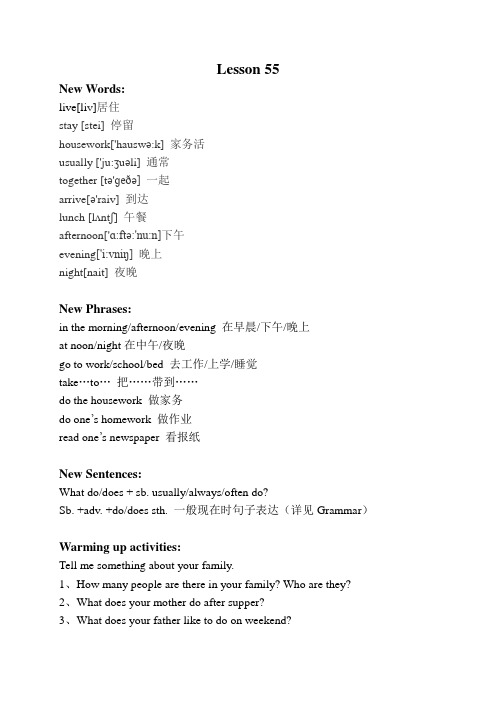一年级上英语课文朗读-lesson55新概念英语青少版
新概念英语第一册lesson55-56(推荐完整)

housework n.家务
Do you often do housework at home? clean the floor / wash the dishes cook dinner
lunch 午饭 breakfast supper dinner(较正式,一般指晚宴) meal [mi:l] 餐 have a big meal
Analyze of the passage
take Please take me with you. take care / take good care of take away see friends visit friends from 从…
from 从……
He is from Sweden. back from work I just back form GZ. then 然后 I always eat, then go the bed. and then First, open your book, and then… 先听录音,然后回答问题。
afternoon 下午
noon 中午,正午 = midday at noon = at midday 在正午 in the morning in the afternoon in the evening at night/noon I often watch TV at night.
usually adv.通常
Key Structures
1.Mr. Sawyer stays at home every day. 2.She always eats her lunch at noon. 3.She usually sees her friends. 4.They often drink tea together. 5.The children always do their homework 6. Mr. Sawyer usually reads his
新概念第一册 Lesson 55-56The Sawyer family (一般现在时)

Grammar: 一般现在时
一般现在时表示经常发生的或习惯性的动作或目前的状态。常与表示频率的时间 状语连用: always, usually, every morning/night/evening/day/week/year, often, etc. 主谓一致: 主语是第三人称单数时, 动词应变成相应的第三人称单数形式。 肯定句:主语+动词+其他
lunch
breakfast /ˈbrekfəst/ n. 早餐 lunch /lʌntʃ/ n. 午饭 dinner /ˈdɪnə(r)/ n. 晚餐
usually frequency word ቤተ መጻሕፍቲ ባይዱ度副词
never 从不 seldom 很少 sometimes有时 often 经常 usually 通常 always 一直
0%
100%
together gather v. 聚集,集合 together /təˈɡeðə(r)/ adv. 一起
Time of the day
noon n. 中午 at noon 在中午
morning 早晨; 上午 in the morning afternoon 下午 in the afternoon
evening 晚上 in the evening
night 夜间 at night
arrive
arrive /əˈraɪv/ v. 到达 (反) leave /liːv/ v. 离开 n. 休假 arrival /əˈraɪvl/ n. 到达 (反) departure /dɪˈpɑːtʃə(r)/ n. 离开,出发
stay stay /steɪ/ v. 呆在,停留 (反) leave /liːv/ v. 离开
新概念英语第一册第55课

• nnigighhtt 一n般. 指夜夜间里 • 晚安 • good night • 在夜里 • at night • 一整夜 • all night • =the whole night • He always does his
stay with sb和某人呆在一起。 她总是和我呆在一起。
eg: She always stays with me.
欧姆龙贸易(上海)有限公司
home
n. 家 ;adv. 住家,到家 1) n. 家 欢迎来我家
eg: Welcome to my home . 在家
at home 呆在家
stay at home 她总是呆在家
• •
我W们e 通u常su在aulls家yuad做loly我ou们r 的hao家dmv庭e.w作通or业常k 。at
home .
• 她通常在晚上打扫房间。
• eg: She usually cleans her room in the evening .
• together adv. 一起
• 一起做某事
She always eats her lunch at noon 。(在正午)
欧姆龙贸易(上海)有限公司
In the afternoon, (在下午 )
she usually sees her friends 。
他总是会见他的朋友 They often drink tea
together.
他们经常在一起喝茶
新概念英语第一册第55课 (2)

2.The +姓氏复数
The Sawyers live at 87 King Street.
做主语视 为复数, 谓语动词 用复数
KEY WORDS live 住、 生活
live in 住在……(国家或城市)
待在家里
Mrs Sawyer stays at home every day.
She does the housework.
做家务
She always eats her lunch
at noon.
In the afternoon, She usually sees her friends. They often drink tea together.
• 注意:不能说和上一个同学一样的单词或 将土豆掉在地上。
87 King Street
The Sawyers live at 87 King Street.
In the morning,
Mr. Sawyer goes to work and the children go to school.
Their father takes them to school every day.
live at 住在……(有确切地址的小地方)
KEY WORDS
at 5 Zhushan Road. I live ____
He lives ____ in England.
lunch
午饭
n.
breakfast n. 早餐 supper n. 晚饭 have breakfast 吃早餐 have lunch 吃午饭 have supper 吃晚饭
新概念英语第一册第55课

Lesson 55: The Greenwood BoysLast week at a party, I met some friends of my sister's. They were charming boys from the south of England. One of them came up to me and asked me if I would like to go to the pictures with him and his friends. I was very happy to accept.They took me to a wonderful film at the local cinema. After the film, we went to a restaurant for dinner. We had a great time together. They were such nice boys!The next day, I received a telephone call from one of the boys. He asked me if I would like to join them on a small trip they were planning. I thought about it for a moment, and then I said yes.They told me that they were going to spend a few days in the country. They planned to stay in a small hotel outside the town. I was very excited about the trip.We set off early in the morning in two cars. It took us about an hour to reach the hotel. It was a lovely old building in a beautiful garden.In the afternoon, we went for a walk in the woods nearby. We saw some amazing birds and animals. In the evening, we played cards and talked together. It was a really enjoyable day.The next day, we went horse riding in the countryside. It was so much fun! We also visited a local farm and saw some cows and sheep.On the last day of our trip, we decided to go sailing on the lake near the hotel. It was a bit windy, but we still had a great time.When it was time to leave, we all got into our cars and drove back home. I had such a wonderful time with those charming boys from the south of England!。
新概念英语第一册55课课件

Lesson 55New Words:live[li v]居住stay[stei] 停留housework['hauswə:k] 家务活usually ['ju:ʒuəli] 通常together[tə'ɡeðə] 一起arrive[ə'raiv] 到达lunch[lʌntʃ] 午餐afternoon['ɑ:ftə:'nu:n]下午evening['i:vniŋ] 晚上night[nait] 夜晚New Phrases:in the morning/afternoon/evening 在早晨/下午/晚上at noon/night在中午/夜晚go to work/school/bed 去工作/上学/睡觉take…to…把……带到……do the housework 做家务do one’s homework 做作业read one’s newspaper 看报纸New Sentences:What do/does + sb. usually/always/often do?Sb. +adv. +do/does sth. 一般现在时句子表达(详见Grammar)Warming up activities:Tell me something about your family.1、How many people are there in your family? Who are they?2、What does your mother do after supper?3、What does your father like to do on weekend?After this, please open your book and turn to Lesson 55, let us see who are the Sawyers, and what do they like to do?Read the paragraph by yourselves and then watch the vedio.Now, please answer my question.What does Mrs. Sawyer usually do in the afternoon?When do the children always do their homework?Grammar:一般现在时:表示经常的习惯性的动作或者是现在的状态,常与表示频度的时间状语连用,表示客观事实或普遍真理。
新概念英语第一册Lesson-55-56 The Sawyer family
n. 下午
New words
usually together evening arrive night
['juʒuəli] [tə'geðə] ['iːvnɪŋ] [ə'raɪv] [naɪt]
adv. 通常 adv. 一起 n. 晚上 v. 到达 n. 夜间
New words
• 形容词性物主代词具有形容词的特性,常放在名词前面作定语, 表明该名词所表示的人或物是\谁的\或xx belongs to sb.
lunch n.午饭
eat lunch = have lunch 吃午饭 一日三餐前的冠词必须省略,而且,表示吃饭的“吃”
既可用 eat ,也可用 have 吃早饭 eat(have) breakfast 吃晚饭 eat(have) supper(英)
eat(have) dinner (美)
morning n.早上
The text
3
Let’s learn the dialogue:
First listen to the tape and answer this question.
When do the children do their homework?
When do the children do their homework? At night, before they go to bed.
此段使用的是哪个时态? 上文中出现了几个动词?分别是哪些?
这些动词的共同点是什么?
一般现在时
• 1.定义:表示经常反复发生的动作或存在的状态。 • 2.标志词:often usually sometimes always never
新概念第一册词汇语法第55课:The Sawyer family索耶一家人
新概念第一册词汇语法第55课:The Sawyer family索耶一家人Lesson 55 The Sawyer family索耶一家人The Sawyer live at 87 King Street.In the morning, Mr. Sawyer goes to work and the children go to school.Mrs. Sawyer stays at home every day. She does the housework.She always eats her lunch at noon.In the afternoon, she usually sees her friends. They often drink tea together.In the evening, the children come home from school. They arrive home early.Mr. Sawyer comes home from work. He arrives home late.At night, the children always do their homework. Then they go to bed. Mr. Sawyer usually reads his newspaper, but sometimes he and his wife watch television.索耶一家住在国王街87号。
早上,索耶先生去上班,孩子们去上学。
父亲每天送孩子们去上学。
索耶夫人每天呆在家里。
她料理家务。
她总是在正午吃午饭。
下午,她总是会见她的朋友。
她们经常在一起喝茶。
傍晚,孩子们放学回家。
他们到家很早。
索耶先生下班回家。
他到家很晚。
晚上,孩子们总是做作业,然后去睡觉。
索耶先生总是读报纸,但有时和他的妻子一起看电视。
1.go to work, 上班。
新概念英语第一册Lesson 55 The Sawyer family
• Watch the video and answer the question.
• When do the children do their homework?
• 索耶一家住在国王街87号、
• 早上,索耶先生去上班,孩子们去上学。父亲每天送孩 子们去上学。
Jimmy doesn’t have lunch at home
3.My father usually reads newspapers in
the morning.(对划线部分提问)
What does your father usually do in the morning?
4.She often does her homework at night.(改一般疑问 句)
(read) • 8. We are going ______ the flowers to the teacher.
(send) • 9. I can’t go now. I must ______ my homework. (do) • 10. Look, they ______ (work) hard.
A. Do, watch B. Does, watches C. Does, watchs D. Does, watch
1.My sister often goes to school on foot. (对划线部分 提问) How does your sister go to school?
2.Jimmy has lunch at home.(改成否定句)
Greece. (come) • 4. The father ______ his children to school now. (take) • 5. Mrs. Smith ______ at home every day. (stay) • 6. The girl can ______ the vase on this table. (put) • 7. Mr. Sawyer usually ______ his newspaper at night.
新概念英语第一册55-56课详解
新概念英语第一册55-56课详解Lesson 55-56 of New Concept English Book 1 Detailed Explanation.Lesson 55: The Sawyer Family.Vocabulary and Expressions:live [lɪv] v.: This verb has multiple meanings. Firstly, it can mean to reside or habitually inhabit a place. For example, "I live in Hefei." Secondly, it can mean to exist or be alive, as in "People cannot live without air." Lastly, it can be used in the expression "live a/an... life" to describe the way someone lives their life.stay [steɪ] v.: This Verb primarily means to remain in a place for a period of time. It can also be used figuratively to mean "remain" in a certain state or condition, as in "stay hungry, stay foolish."home [həʊm] n./adv.: As a noun, it refers to the place where one lives. As an adverb, it means "to the place where one lives," as in "go home."housework ['haʊswɜːk] n.: This noun refers to the tasks related to maintaining a household, such as cleaning, cooking, and laundry.lunch [lʌnʃ] n.: This noun refers to the meal eaten in the middle of the day.afternoon [ɑːftə'nuːn] n.: This noun refers to the period of time between noon and evening.Text Explanation:Lesson 55 introduces the Sawyer family and their daily routine. The lesson begins by introducing the family members and their occupations. Mr. Sawyer works in an office, while Mrs. Sawyer stays at home. The children go to school. The lesson then goes on to describe their eveningactivities. Mr. Sawyer usually arrives home from work at about five o'clock, and the family then has their lunch together. In the afternoon, they often have a rest, andthen in the evening, they usually stay at home and watch television.Grammar Points:The use of "-s" or "-es" to form the third-person singular present tense of verbs is reinforced in this lesson. For example, "Mr. Sawyer usually arrives home from work at about five o'clock."The use of prepositions with "live" is also introduced. For example, "Mr. Sawyer lives in a town near London,"where "in" is used with a large place, and "Mrs. Sawyerlives at 87 King Street," where "at" is used with aspecific address.Lesson 56: What Do They Do?Vocabulary and Expressions:together [tə'geðə] adv.: This adverb means "in a group" or "side by side."evening ['iːvnɪŋ] n.: This noun refers to the time of day that comes after afternoon and before night.arrive [ə'raɪv] v.: This Verb means to reach a destination after a journey.night [naɪt] n.: This noun refers to the period of time from sunset to sunrise.Text Explanation:Lesson 56 continues the theme of the Sawyer family's daily life by asking the question, "What do they do?" The lesson provides information about the family's evening activities. Mr. Sawyer usually arrives home from work at about five o'clock, and then the family has their tea together. After tea, they usually sit in the living room and watch television. Sometimes, they go to the cinema orto the theater. On Sundays, they often go for a walk in the park.Grammar Points:The present tense of verbs is reinforced in this lesson, particularly the use of the third-person singular form.The lesson also introduces the use of modal verbs such as "can" and "usually" to express ability and frequency.Conclusion:Lessons 55 and 56 of New Concept English Book 1 focus on the Sawyer family's daily routine and activities. These lessons introduce new vocabulary and expressions related to family life, daily activities, and grammar points such as the use of "-s" or "-es" in the third-person singular present tense and the use of modal verbs. By learning these lessons, students can improve their understanding of family life in English-speaking countries and enhance theirlanguage skills in areas such as vocabulary, grammar, and comprehension.。
